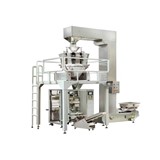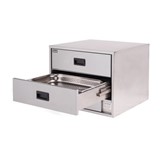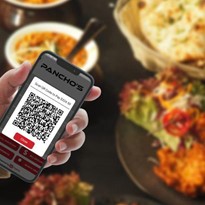With advancements in machine learning, natural language processing, and data analytics, AI has revolutionized the way businesses operate, enhancing customer experiences and optimizing operations.
From personalized recommendations to automated processes, AI has made its mark in the hospitality and food industry, reshaping the landscape and driving innovation. While many believe that AI has been designed to replace the human element in business, it’s actually created to support and empower, allowing businesses to give clients the best experience possible.
Enhanced Customer Experience
AI has significantly improved the customer experience in the food industry. With the power of AI, businesses can provide 24/7 customer support, address queries, and offer personalized recommendations. AI can handle routine tasks like reservation inquiries and menu recommendations, freeing up staff to focus on more complex guest needs.
When the luxury of online menus coming as standard these days, guests don’t need to worry or feel embarrassed about the number of customisations they want to make to their order. And they also don’t need to worry about parts of their order getting lost in translation somewhere between the order and the kitchen.
AI algorithms also have the ability to analyze vast amounts of customer data, including preferences, feedback, and social media interactions, to provide tailored recommendations. This enables businesses to offer personalized experiences, such as suggesting specific dishes based on dietary requirements or recommending drinks based on meal selection. By leveraging AI, restaurants can anticipate and exceed customer expectations, leading to higher satisfaction and loyalty.
Streamlined Operations
AI has streamlined operations in the food industry, optimizing efficiency and reducing costs. Intelligent systems can analyze historical data and predict demand patterns, allowing businesses to optimize staffing levels, inventory management, and pricing strategies. For example, restaurants can adjust rates based on factors like seasonality, public holidays, and local events, maximizing revenue.
AI-powered automation has improved various processes, including check-ins, order management, and inventory control. Self-service kiosks and mobile apps enable guests to bypass lengthy queues, enhancing convenience for the customer and efficiency for the business. In the food industry, AI-driven inventory management systems can monitor stock levels, predict demand, and automate reordering processes, reducing waste and minimizing stockouts.
AI-powered kitchen automation is another significant advancement. Robotics and computer vision systems can streamline food preparation, reducing errors and improving consistency. Autonomous robots can perform repetitive tasks, such as dishwashing or food delivery, freeing up human resources for more specialized roles. This automation improves productivity, decreases operational costs, and ensures a faster and more efficient service.
Improved Safety And Quality
AI plays a crucial role in ensuring safety and quality standards in the hospitality and food industry. AI-driven systems can monitor food safety protocols, detecting anomalies in temperature, storage, and hygiene. For instance, sensors embedded in refrigeration units can alert staff to potential issues, preventing spoilage and ensuring food safety compliance. AI-powered cameras can also identify hazards or potential risks, such as slip and fall accidents, enabling proactive measures to prevent accidents and maintain a safe environment for guests and staff.
Additionally, AI algorithms can analyze customer feedback and online reviews to identify patterns and sentiment analysis. This allows businesses to identify areas for improvement, address customer concerns promptly, and continuously enhance the quality of their service.
Improved Resource Management And Sustainability
AI has significantly contributed to better resource management and sustainability practices in the hospitality and food industry. By analyzing data on energy consumption, water usage, and waste generation, AI-powered systems can identify areas of inefficiency and suggest strategies for optimization. For instance, AI can analyze occupancy patterns and adjust heating, cooling, and lighting settings in hotels to minimize energy waste.
In the food industry, AI can assist in reducing food waste by predicting demand accurately and optimizing production and inventory levels accordingly. By minimizing waste, businesses can reduce their environmental footprint and contribute to sustainable practices.
AI also enables businesses to implement more effective marketing strategies. By analyzing customer data and behaviour, AI algorithms can target specific demographics with personalized promotions and advertisements. This targeted approach not only enhances marketing effectiveness but also reduces unnecessary advertising expenditures.
Happier Staff
AI’s impact on the hospitality and food industry goes beyond customer experience and operational efficiency. It also plays a significant role in improving employee satisfaction and well-being. With the automation of repetitive and mundane tasks, staff members can focus on delivering exceptional service and engaging with guests on a more personal level.
AI-powered systems can assist staff in their daily tasks, providing them with valuable information and support. For example, employees can access AI-powered platforms that offer real-time translations to overcome language barriers with international guests. This facilitates effective communication and enhances guest interactions, leading to improved guest satisfaction and happier staff.
Another valuable addition is that AI can optimize employee scheduling, considering factors such as staff availability, skills, and workload demands. By creating more balanced and fair schedules, AI helps reduce stress and fatigue among employees, promoting a healthier work-life balance.
AI can also provide valuable insights and training opportunities for staff development. By analyzing customer data and feedback, AI algorithms can identify areas where additional training or skills development may be required, enabling businesses to provide targeted training programs to enhance staff performance and career growth.
Conclusion
It’s almost impossible to overstate the influence of AI on the hospitality and food industry. It’s completely transformed customer experiences, streamlined operations, improved safety and quality, enhanced resource management and sustainability, and contributed to happier staff. AI’s impact on the industry continues to drive innovation and positively reshape the way businesses operate.
While AI brings numerous benefits, it’s important to strike a balance between automation and human touch. Human interaction will always be essential in delivering exceptional hospitality experiences, and AI should be seen as a tool to support and empower employees. By harnessing the power of AI while nurturing a human-centred approach, businesses can unlock the full potential of technology, creating a harmonious blend of AI-driven efficiency and personalized service in the ever-evolving hospitality and food industry. It’s exciting to think about what AI will be able to help with next.























